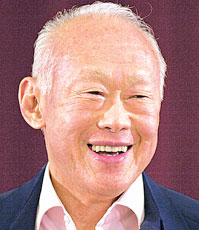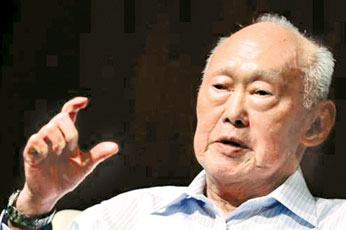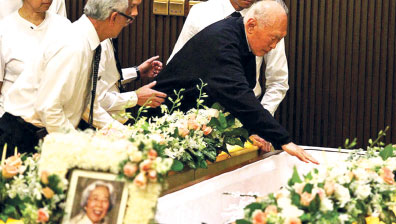Lee's legacy
Lee Kuan Yew: feared founder of modern Singapore Lee Kuan Yew, one of
the commanding figures of Asia's post-war economic rise, was an
authoritarian leader who transformed Singapore from a sleepy British
imperial outpost into a global trading and financial centre.
 The former prime minister known as 'LKY' died Monday following a
seven-week struggle with pneumonia, aged 91, after bestriding the
city-state's politics for half a century following its emergence from
colonial rule. The former prime minister known as 'LKY' died Monday following a
seven-week struggle with pneumonia, aged 91, after bestriding the
city-state's politics for half a century following its emergence from
colonial rule.
US President Barack Obama said after meeting the still healthy Lee at
the White House in October 2009 that "This is one of the legendary
figures of Asia in the 20th and 21st centuries".
Incomes rose
The Cambridge-educated lawyer set Singapore on a path that has seen
average incomes rise 100 times, with investments across the globe, a
widely respected civil service and world-class infrastructure.
But he was criticised for his iron-fisted rule, forcing several
opposition politicians into bankruptcy or exile, and once invoked
Machiavelli in declaring: "If nobody is afraid of me, I'm
meaningless".Lee's political career spanned 30 years as premier and 20
years as senior government adviser.
But in his last years, he was a shadow of his old self as his health
deteriorated following his beloved wife's death in October 2010.
He remained revered by many but also became the target of scathing
attacks in social media as some Singaporeans began to muster the courage
to speak out against him and the political and social model he had
bequeathed.
His impact, through his policies and via his son, current Prime
Minister Lee Hsien Loong, is likely to be felt for years to come.
 Lee Kuan Yew first became prime minister after Britain granted
Singapore self-rule in 1959 prior to its stormy post-colonial union with
Malaysia. Lee Kuan Yew first became prime minister after Britain granted
Singapore self-rule in 1959 prior to its stormy post-colonial union with
Malaysia.
Six years later, he was thrust onto the world stage when he became
the leader of a fragile new republic after the largely
ethnically-Chinese Singapore, with just two million people, was ejected
from the Malaysian Federation.
Improbable chance of survival
"We faced tremendous odds with an improbable chance of survival, Lee
wrote in his memoirs.
"We inherited the island without its hinterland, a heart without a
body. "But under his stewardship, Singapore courted international
capital and used foreign labour to plug its manpower gap until it became
one of Asia's wealthiest, safest and most stable societies.
Despite criticism of Lee's autocratic rule, Singapore was widely
hailed as a model for development during a period when it soared above
other former colonies that endured conflict and economic mismanagement.
Dismissive of liberal democracy, Lee anticipated the emergence of
China as a world power and established close links with Beijing, giving
Singapore investors enviable access to the giant market.
Power
At the height of his powers, a number of opponents went bankrupt or
fled into exile after being ordered to pay hundreds of thousands of
dollars in defamation damages to Lee and members of his inner circle,
while alleged radicals were held without charges under internal-security
laws.
Lee also launched what critics called a 'nanny state' that urged
highly educated Singaporeans to intermarry and produce smart babies,
banned sales of chewing gum and hectored its public about spitting on
the streets and failing to flush public toilets.
Brutal wartime education
Born on September 16, 1923 to a 20-year-old father whom he described
as a rich man's son, with little to show for himself and a 16-year-old
bride in an arranged marriage, Lee grew up thinking British colonial
rulers were invincible.
He had a rude awakening during World War II after Japanese invaders
easily overran British forces and took over Singapore in 1942,
shattering the myth of European supremacy in Asia.
Japanese occupation
"The dark ages had descended on us. It was brutal, cruel," Lee said
of the Japanese occupation, calling it "the biggest single political
education of my life because, for three and a half years, I saw the
meaning of power".
Lee survived massacres of civilians and at one point worked for
Japanese propaganda. After liberation, he left to study law at
Cambridge, where he secretly wed his classmate Kwa Geok Choo before
returning home in 1950.
Lee was shaken by Kwa's passing away after more than 60 years of
marriage and admitted that "at this moment of the final parting, my
heart is heavy with sorrow and grief".
They had three children, the oldest of whom is Lee Hsien Loong.
Daughter Lee Wei Ling became a doctor, and son Lee Hsien Yang became a
top corporate figure.Lee stepped down as prime minister in 1990 and
handed power to hisdeputy Goh Chok Tong, who in turn gave way to the
veteran leader's elder son in 2004.
In 2011, he stepped down as a cabinet adviser after the ruling
People's Action Party suffered its worst performance yet in a general
election, its share of the vote falling to a low of 60 percent.
Guardian
Lee Kuan Yew:
The last farewell to my wife
Excerpts of the eulogy delivered by Lee Kuan Yew at the funeral
service of his wife, Kwa Geok Choo, at a private ceremony at Mandai
Crematorium in 2010 giving some rare insight into the life and times of
a man who was much more than a charismatic leader
I recall the ritual mourning when my maternal grandmother died some
75 years ago. For five nights the family gathered to sing her praises
and wail and mourn at her departure, led by a practised professional
mourner.
 |
|
Lee bids his wife, Madam Kwa Geok Choo
farewell at the Mandai Crematorium in Singapore on October 6,
2010. Photo: AFP |
Such rituals are no longer observed. My family's sorrow is to be
expressed in personal tributes to the matriarch of our family.
Mortality
In October 2003 when she had her first stroke, we had a strong
intimation of our mortality.
My wife and I have been together since 1947 for more than three
quarters of our lives. My grief at her passing cannot be expressed in
words. But today (Wednesday), when recounting our lives together, I
would like to celebrate her life.As a young man with an interrupted
education at Raffles College and no steady job or profession, her
parents did not look upon me as a desirable son-in-law. But she had
faith in me.
We had committed ourselves to each other. I decided to leave for
England in September 1946 to read law, leaving her to return to Raffles
College to try to win one of the two Queen's Scholarships awarded
yearly. We knew that only one Singaporean would be awarded.
I had the resources, and sailed for England, and hoped that she would
join me after winning the Queen's Scholarship. If she did not win it,
she would have to wait for me for three years. In June the next year,
1947, she did win it.
We have kept each other company ever since. We married privately in
December 1947 at Stratford-upon-Avon. At Cambridge, we both put in our
best efforts. She took a first in two years in Law Tripos II. I took a
double first, and a starred first for the finals, but in three years.
Returning to Singapore, we both were taken on as legal assistants in
Laycock & Ong, a thriving law firm in Malacca Street. Then we married
officially a second time that September 1950 to please our parents and
friends. She practised conveyancing and draftsmanship, I did litigation.
In February 1952, our first son, Hsien Loong, was born. She took
maternity leave for a year.That February, I was asked by John Laycock,
the Senior Partner, to take up the case of the Postal and
Telecommunications Uniformed Staff Union, the postmen's union.
They were negotiating with the government for better terms and
conditions of service. After a fortnight, they won concessions from the
government. Choo, who was at home on maternity leave, pencilled through
my draft statements, making them simple and clear.
Over the years, she influenced my writing style. Now I write in short
sentences, in the active voice. We gradually influenced each other's
ways and habits as we adjusted to and accommodated each other.
We knew that we could not stay starry-eyed lovers all our lives; that
life was an on-going challenge with new problems to resolve and manage.
We had two more children, Wei Ling in 1955 and Hsien Yang in 1957. She
brought them up to be well-behaved, polite, considerate and never to
throw their weight around as the prime minister's children. As a lawyer,
she earned enough to free me from worries about the future of our
children.
We never argued over the upbringing of our children, nor over
financial matters. Our earnings and assets were jointly held. We were
each other's confidante.
She had majored in English literature at Raffles College and was a
voracious reader, reading everything from Jane Austen to J.R.R. Tolkien,
from Thucydide's' The Peloponnesian Wars to Virgil's Aeneid, to The
Oxford Companion to Food, and Seafood of Southeast Asia, to Roadside
Trees of Malaya, and Birds of Singapore.She helped me draft the
Constitution of the PAP. For the inaugural meeting at Victoria Memorial
Hall on 4 November 1954, she gathered the wives of the founder members
to sew rosettes for those who were going on stage.
In my first election for Tanjong Pagar, our home in Oxley Road became
the HQ to assign cars provided by my supporters to ferry voters to the
polling booth.
She warned me that I could not trust my new found associates, the
leftwing trade unionists led by Lim Chin Siong. She was furious that he
never sent their high school student helpers to canvass for me in
Tanjong Pagar, yet demanded the use of cars provided by my supporters to
ferry my Tanjong Pagar voters.
When we were about to join Malaysia, she told me that we would not
succeed because the Umno Malay leaders had such different lifestyles and
because their politics were communally-based, on race and religion.
I replied that we had to make it work as there was no better choice.
But she was right. We were asked to leave Malaysia before two years
had passed.
When separation was imminent (in 1965), Eddie Barker, as Law
Minister, drew up the draft legislation for the separation. But he did
not include an undertaking by the Federation Government to guarantee the
observance of the two water agreements between the PUB (Public Utilities
Board) and the Johor state government. I asked Choo to include this. She
drafted the undertaking as part of the constitutional amendment of the
Federation of Malaysia Constitution itself.
Meticulous
She was precise and meticulous in her choice of words. The amendment
statute was annexed to the Separation Agreement, which we then
registered with the United Nations. The then Commonwealth Secretary
Arthur Bottomley said that if other federations were to separate, he
hoped they would do it as professionally as Singapore and Malaysia.
It was a compliment to Eddie and Choo's professional skills. Each
time Malaysian leaders threatened to cut off our water supply, I was
reassured that this clear and solemn international undertaking by the
Malaysian government in its Constitution will get us a ruling by the
UNSC (United Nations Security Council).
After her first stroke, she lost her left field of vision. This
slowed down her reading. She learned to cope, reading with the help of a
ruler. She swam every evening and kept fit. She continued to travel with
me, and stayed active despite the stroke. She stayed in touch with her
family and old friends.
She listened to her collection of CDs, mostly classical, plus some
golden oldies. She jocularly divided her life into 'before stroke' and
'after stroke', like BC and AD.
Her second stroke on 12 May 2008 was more disabling. I encouraged and
cheered her on, helped by a magnificent team of doctors, surgeons,
therapists and nurses. Her nurses, WSOs and maids all grew fond of her
because she was warm and considerate. When she coughed, she would take
her small pillow to cover her mouth because she worried for them and did
not want to infect them. Her mind remained clear but her voice became
weaker. When I kissed her on her cheek, she told me not to come too
close to her in case I caught her pneumonia. When given some peaches in
hospital, she asked the maid to take one home for my lunch. I was at the
centre of her life.
Comfortable
On 24 June 2008, a CT scan revealed another bleed again on the right
side of her brain. There was not much more that medicine or surgery
could do except to keep her comfortable. I brought her home on 3 July
2008. The doctors expected her to last a few weeks. She lived till
October 2, two years and three months.
She remained lucid. That gave time for me and my children to come to
terms with the inevitable. In the final few months, her faculties
declined. She could not speak but her cognition remained. She looked
forward to have me talk to her every evening.
Her last wish she shared with me was to enjoin our children to have
our ashes placed together, as we were in life.The last two years of her
life were the most difficult. She was bedridden after small successive
strokes; she could not speak but she was still cognisant. Every night
she would wait for me to sit by her to tell her of my day's activities
and to read her favourite poems.Then she would sleep.
I have precious memories of our 63 years together. Without her, I
would be a different man, with a different life. She devoted herself to
me and our children.
She was always there when I needed her. She has lived a life full of
warmth and meaning.
I should find solace in her 89 years of a life well- lived. But at
this moment of the final parting, my heart is heavy with sorrow and
grief.
- The Star Online |

